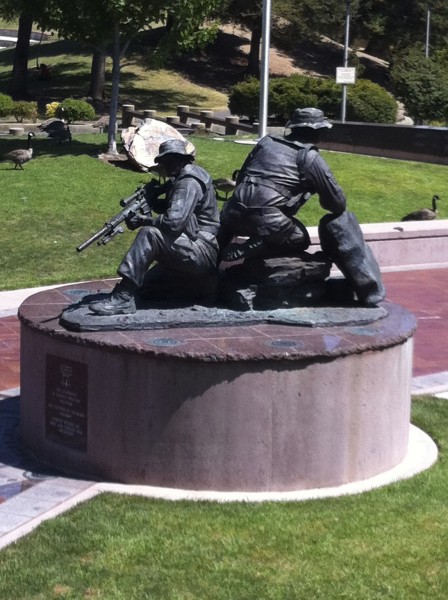Where do you seek your standards for leadership?
The following includes an excerpt from Steven Pressfield’s book “Gates of Fire,” the epic novel about the warrior culture of the Greek Spartans and the famed Battle of Thermopylae in 480 BC.
I was led to this novel during a time when my spirit was thirsting to further define leadership and one of the first places I began searching was through a return to military memoirs and books. In 2011, stories about Navy SEALS where becoming quite prominent on the shelves and the first one I read was Eric Greitens’ “The Heart and the Fist,” captivatingly subtitled, “The Education of a Humanitarian, the Making of a Navy SEAL.”
Greitens wrote how he recommended “Gates of Fire” to the men under his command so that was recommendation enough for me to add it to my reading list.

Navy SEAL’s James Suh and Matt Axelson. Modern day Spartans. Operation Red Wings Memorial, Cupertino (Matt Axelson’s home town) California (photo: Challen Yee).
“Gates of Fire” illustrates many leadership types and the passage selected, which I have titled The Substance of a King, comes from near the end of the Pressfield’s book as the final battle takes center stage.
It’s a beautifully written passage highlighting the high moral standards and humanity for those privileged to attain positions of leadership.
The Substance of a King
I will tell His Majesty what a king is. A king does not abide within his tent while his men bleed and die upon the field. A king does not dine while his men go hungry, nor sleep when they stand at watch upon the wall. A king does not command his men’s loyalty through fear nor purchase it with gold; he earns their love by the sweat of his own back and the pains he endures for their sake. That which comprises the harshest burden, a king lifts first and sets down last. A king does not require service of those he leads but provides it to them. He serves them, not they him.
In the final moments before the actual commencement of battle, when the lines of the Persians and Medes and Sacae, the Bactrians and Illyrians, Egyptians and Macedonians, lay so close across from the defenders that their individual faces could be seen, Leonidas moved along the Spartan and Thespaian foreranks, speaking with each platoon commander individually. When he stopped beside Dienekes, I was close enough to hear his words.
“Do you hate them, Dienekes?” the king asked in the tone of a comrade, unhurried, conversational, gesturing to those captains and officers of the Persians proximately visible across the oudenos chorion, the no-man’s-land.
Dienekes answered at once that he did not. “I see faces of gentle and noble bearing. More than a few, I think, whom one would welcome with a clap and a laugh to any table of friends.”
Leonidas clearly approved my master’s answer. His eyes seemed, however, darkened with sorrow.
“I am sorry for them,” he avowed, indicating the valiant foemen who stood so proximately across. “What wouldn’t they give, the noblest among them, to stand here with us now?”
That is a king… A king does not expend his substance to enslave men, but by his conduct and example makes them free.
.
If you see the value in this, please like, share and comment.
.
I’ll see you… on the next page.

